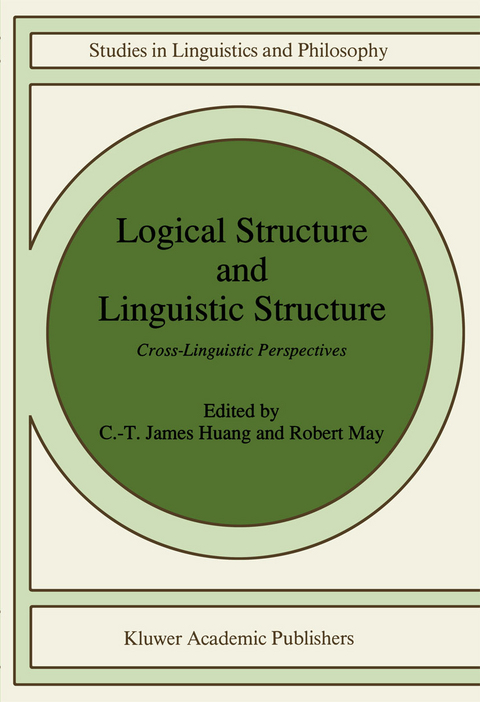
Logical Structure and Linguistic Structure
Cross-Linguistic Perspectives
Seiten
1992
Springer (Verlag)
978-0-7923-1636-7 (ISBN)
Springer (Verlag)
978-0-7923-1636-7 (ISBN)
Presents contributions to a comparative semantics, understood in the context of the theory of Logical Form as a branch of comparative syntax. In contrastively exploring a range of languages, it aims to provide new insights into the nature of quantificational, WH and anaphoric phenomena.
In comparative syntax a general approach has been pursued over the past decade predicated on the notion that Universal Grammar allows of open parameters, and that part of the job of linguistic theory is to specify what values these parameters may have, and how they may be set, given primary linguistic data, to determine the grammars of particu lar languages. The papers presented in this volume are also concerned with language variation understood in this way. Their goals, however, do not strictly fall under the rubric of comparative syntax, but form part of what is more properly thought of as a comparative semantics. Semantics, in its broadest sense, is concerned with how linguistic structures are associated with their truth-conditions. A comparative semantics, therefore, is concerned with whether this association can vary from language to language, and if so, what is the cause of this variation. Taking comparative semantics in this way places certain inherent limitations on the search for the sources of variability. This is because the semantic notion of truth is universal, and does not vary from language to language: Sentences either do or do not accurately characterize what they purport to describe. ! The source of semantic variability, therefore, must be somehow located in the way a language is structured.
In comparative syntax a general approach has been pursued over the past decade predicated on the notion that Universal Grammar allows of open parameters, and that part of the job of linguistic theory is to specify what values these parameters may have, and how they may be set, given primary linguistic data, to determine the grammars of particu lar languages. The papers presented in this volume are also concerned with language variation understood in this way. Their goals, however, do not strictly fall under the rubric of comparative syntax, but form part of what is more properly thought of as a comparative semantics. Semantics, in its broadest sense, is concerned with how linguistic structures are associated with their truth-conditions. A comparative semantics, therefore, is concerned with whether this association can vary from language to language, and if so, what is the cause of this variation. Taking comparative semantics in this way places certain inherent limitations on the search for the sources of variability. This is because the semantic notion of truth is universal, and does not vary from language to language: Sentences either do or do not accurately characterize what they purport to describe. ! The source of semantic variability, therefore, must be somehow located in the way a language is structured.
Bound and Referential Pronouns.- Logical Form and Barriers in Navajo.- Towards a Modular Theory of Coreference.- Head Government in LF-Representations.- Logical Structure in Syntactic Structure: The Case of Hungarian.- In Defense of the Correspondence Hypothesis: Island Effects and Parasitic Constructions in Logical Form.- Construing WH.- Two Properties of Clitics in Clitic-Doubled Constructions.- LF Movement in Iraqi Arabic.- List of Contributors.
| Reihe/Serie | Studies in Linguistics and Philosophy ; 40 |
|---|---|
| Zusatzinfo | XXVIII, 287 p. |
| Verlagsort | Dordrecht |
| Sprache | englisch |
| Maße | 152 x 223 mm |
| Themenwelt | Geisteswissenschaften ► Philosophie ► Sprachphilosophie |
| Geisteswissenschaften ► Sprach- / Literaturwissenschaft ► Sprachwissenschaft | |
| Sozialwissenschaften | |
| ISBN-10 | 0-7923-1636-3 / 0792316363 |
| ISBN-13 | 978-0-7923-1636-7 / 9780792316367 |
| Zustand | Neuware |
| Haben Sie eine Frage zum Produkt? |
Mehr entdecken
aus dem Bereich
aus dem Bereich
Macht und Legitimität politischer Sprache im Prozess der europäischen …
Buch | Softcover (2023)
Nomos (Verlag)
74,00 €
KI, Kreativität und algorithmische Postrationalität
Buch | Softcover (2024)
Matthes & Seitz Berlin (Verlag)
16,00 €
Wie die Menschheit zu ihrer größten Erfindung kam
Buch | Softcover (2022)
C.H.Beck (Verlag)
18,00 €


